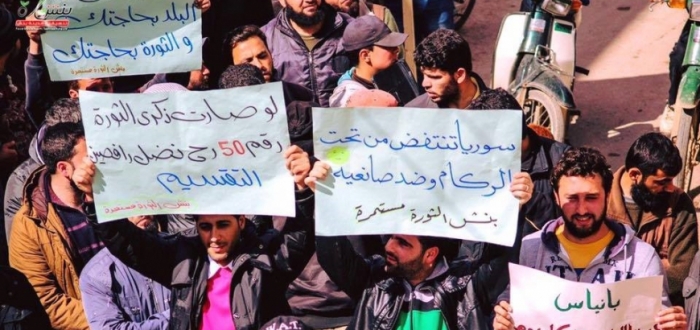Syrian revolutionaries opposed to the Assad regime were alive on Tuesday, the fifth anniversary of the outbreak of their revolution – which began in March 2011 – at a time when they confront huge challenges, led by the fierce military campaign waged by the Assad regime and its allies Russia and Iran, as the country faces the threat of division.
The regime’s efforts have failed to extinguish the revolution of the people, who have demanded since the beginning their rights of freedom, justice and equality and an end to the security regime which has disappeared thousands of Syrians in its secret and public prisons. Despite the continuing bombardment and campaigns of systematic starvation, the flag of the Syrian revolution still flutters in areas under the opposition’s control, just as the throats of the revolutionaries still chant the slogan: “The people want the downfall of the regime.”
Syria’s revolutionaries have lived through great pain over these five years, and have seen the silence of the international community towards the regime’s crimes increase their plight, as thousands of Syrian families have lost members and others have been wounded, turning what has occurred in Syria into “the tragedy of the century,” according to the United Nations. But all this has not weakened the determination of the revolutionaries, who have confirmed in slogans during the protests that they are insistent on realizing their demands, whatever the price.
The revolutionaries have clung to a number of demands, the most prominent five of which can be summarized as:
The departure of Assad. This demand remains at the head of the Syrian revolutionaries’ aspirations. When they raised this slogan at an early stage of the revolution, the regime began to send military forces to kill protesters, as it realized it was following in the footsteps of former Tunisian President Zein al-Abedine bin Ali and his Egyptian counterpart Hosni Mubarak. Revolutionaries have still not accepted any solution in which Assad and the leadership of his regime remain in power in Syria, and have demanded they end up behind bars of the courts. In a demonstration last week in the Idleb countryside, protesters demonstrated behind a sign which said: “Faced with these people, you have no choice but to go.”
The withdrawal of foreign powers. The confrontation of Syrian revolutionaries with the Assad regime widened with the beginning of the Iranian intervention on its behalf, followed by the Russian intervention, and in between them the mobilization of dozens of militias, most prominently Hezbollah, to confront the opposition. Revolutionaries began confronting nations and entities in which they saw a clear occupation of their land, and began working to expel them as a basic part of their military struggle and in the squares of their protests.
As the regime brought in several foreign powers to support it, the defiant Syrian people called for their departure and have expressed on various occasions and in various forms their determination to fight the occupation until it is destroyed, as previously occurred with France’s mandate of Syria.
The unity of Syria. The revolutionaries reject any talk or option which leads to the partition of Syrian territory and division of its residents, and have noticed that at this stage there are schemes, accompanied by media campaigns and statements, saying that Syria is no longer united and may not remain united as it was. But this approach does not resonate with the revolutionaries, who consider partition a red line which they cannot accept, and who summarize their insistence upon this with signs raised at the protests, on which are written: “Neither Assad nor partition – we swear neither this nor that.”
Release of prisoners. This demand shines light on one of the most tragic aspects of what the regime has caused against the Syrian people. As the Syrian revolution enters its sixth year, there are still regime security branches arresting revolutionaries and not hesitating to kill them, whether they are women, children, elderly or young men.
The regime faces accusations from UN human rights officials, who said last February that government forces have arrested tens of thousands of Syrian civilians on charges of supporting the opposition or because they have not sufficiently supported the government.
Despite tyranny which strews blood and corpses on the lives of Syrians daily, the pain of the prisoners remains present in the hearts of the revolutionaries, who insist that any solution in Syria must not forget the prisoners, and who demand that those implicated in their arrests and killing be held to account.
Breaking up the agencies of oppression. The security agencies remain a primary reason for the bloodshed in Syria. These agencies have transformed the lives of Syrians into a dark nightmare. They arrest them arbitrarily, and have ended the lives of thousands without accountability. The revolutionaries demand an end to the violations of the security branches, whose crimes are not limited as they say to the last five years, but stretch back to the first months after Hafez al-Assad took power in Syria through a military coup in 1970.
The revolutionaries have gathered despite the bleakness of the scene they are living through and the many chapters of their suffering. They are still convinced that the will of the people can conquer the injustice of tyranny and that the sun of freedom will shine from among the clouds of the martyrs, the cries of the wounded, and the wails of the imprisoned.
This article was translated and edited by The Syrian Observer. Responsibility for the information and views set out in this article lies entirely with the author.


